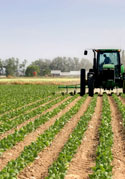The Benefits of Trace Mineral Nutrition
 If you own any form of food growing operation, from home garden to pasture property or horticulture enterprise, then you will benefit from the following information as it is highly likely that you have neglected trace mineral nutrition. We know this to be the case because our team of agronomists are involved in thousands of soil and leaf analyses each year and the vast majority of these are lacking trace minerals.
If you own any form of food growing operation, from home garden to pasture property or horticulture enterprise, then you will benefit from the following information as it is highly likely that you have neglected trace mineral nutrition. We know this to be the case because our team of agronomists are involved in thousands of soil and leaf analyses each year and the vast majority of these are lacking trace minerals.
It has been estimated that our food contains just 20% of the nutrition found in the food consumed by our grandparents when they were young and the demineralisation of our soils is a large part of this story. This loss of minerals is linked to four issues. For decades fertilisers have been based on a handful of minerals because it was mistakenly believed that these were the only minerals required for plant growth. With each crop there is a little of every mineral removed but only a few minerals returned. Secondly, the fertilisers we have been using are often based upon either sulphates or nitrates, both of which are highly leachable. When these minerals leach they often attach to a trace mineral and remove that mineral from the soil profile. Thirdly, many of the hybridised plants have reduced capacity to uptake trace minerals, even if they are present. Finally, it is now understood that the uptake of trace minerals is governed by micro-organisms many of whom have been compromised by farm chemicals or poor soil management decisions. The solution to replacing these missing trace minerals is to apply them with the microbes that will deliver them to the plant in a composted, all inclusive dry mineral fertiliser. Ideally this approach could be complemented with a foliar spray of a chelated trace mineral blend.
The Key Roles of Trace Minerals
Trace minerals are often viewed as insignificant tag-ons to major minerals because they are not used in great quantities by the plant. However, this is incorrect. These nutrients are used as catalysts to trigger multiple reactions and only small amounts are required (but this has no bearing on their importance). If we look at the trace mineral zinc, for example, we see that it has many roles, including drought protection, but its most important role in the plant is for the formation of growth hormones called auxins. Auxins are hugely important because they govern leaf size. 95% of crop production comes from photosynthesis and the size of the solar panel (the leaf) plays a large role in photosynthetic potential. The bottom line is that this little trace mineral can have a big impact on yield and profitability. Similarly, a trace mineral like molybdenum, which is required at a lot lower rates than zinc, can have a major negative impact on profitability if it is deficient. The reason for this is that molybdenum is an essential component of nitrogen fixation – sourcing your nitrogen free from the atmosphere where 74, 000 tonnes is present above every hectare. In some recent research in NZ, in molybdenum-deficient soils, there were yield increases ranging from 40% to 600%, based upon the addition of a couple of cups of sodium molybdate per hectare.
Cobalt is also required for nitrogen fixation and it is missing in most soils we test. Silica is the flavour of the month in agricultural research as more and more studies confirm that it is a major player in disease protection. Silica strengthens the cell wall to discourage pathogens and insects and it also activates the plants own defence system to allow it to fight its own battles. The plant-available form of silica is deficient in 90% of the many soils we test!Boron leaches very easily, particularly in low carbon soils, and the major mineral, calcium, does not perform its many roles in the absence of boron. It is a very common mistake to lime your soils and see very little response because you did not address your boron deficiency, as calcium does not work without a boron synergist.
The NTS Solutions
NTS has developed a complete, composted fertiliser which contains luxury levels of all trace minerals as well as all the major minerals, in a proven, high-performance formulation. This popular product is called Nutri-Store Gold™ and it is perfect for home gardeners, small acreages or intensive horticulture, if a complete fertiliser is required. Micro-organisms that specialise in nutrient delivery have been inoculated into this powdered blend. This complete fertiliser can be further supported with a liquid blend of all seven trace minerals called Shuttle Seven™. This liquid contains very high levels of iron, manganese, boron, copper, manganese, cobalt and molybdenum and it also has a silica tag-on. These trace minerals are chelated with the unique Shuttle Nutrient Delivery System which delivers minerals much more effectively than previously possible. We have had tremendous feedback about both of these products for at least a decade.